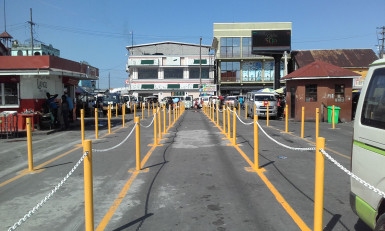The Mayor and City Council in collaboration with Ministry of Public Infrastructure will soon be implementing a new queue system at all bus parks in Georgetown to reduce the daily chaos and congestion.
Town Clerk Royston King told Stabroek News yesterday that the system, which includes metal poles and chain barriers to demarcate the lines, will be evident at most bus parks. However there will be a few exceptions; for example, the Route 44 (Georgetown-Mahaica) bus park will have only lines painted on the roadway instead of the erected poles and chains evident at the routes 46, 41 and 45 parks outside of the Stabroek Market

According to a source at Mayor and City Council, the constabulary will soon implement a monitoring and a security system to prevent “hot plating,” whereby drivers load passengers outside of the line. The new arrangement will now operate on a first come first go basis-mini buses will have to await their turn in order to move off from the parks.
When Stabroek News visited the Routes 40 (Kitty-Campbellville), 48 (Sophia), 46 (D’Urban), 45 (Hospital-Lamaha) bus parks, it was obvious that the erection of the poles was incomplete. Nonetheless, several of the drivers who spoke with the newspaper welcomed the idea of the new system, while stating that it was a positive move which will eventually eradicate the problem of “hot plating” at the parks.
Shameer Mohamed, a Route 40 minibus driver, while appreciative of the new arrangement, stressed the need for additional monitoring at the front and the back of the lines in order to stop “hot plating.” Other drivers complained that the width between the lines was too narrow for passengers to board their buses and recommended that a walkway be placed for them.
With regard to the maintenance and upkeep of the line system, King said a small fee of $200 would be requested from the drivers.





